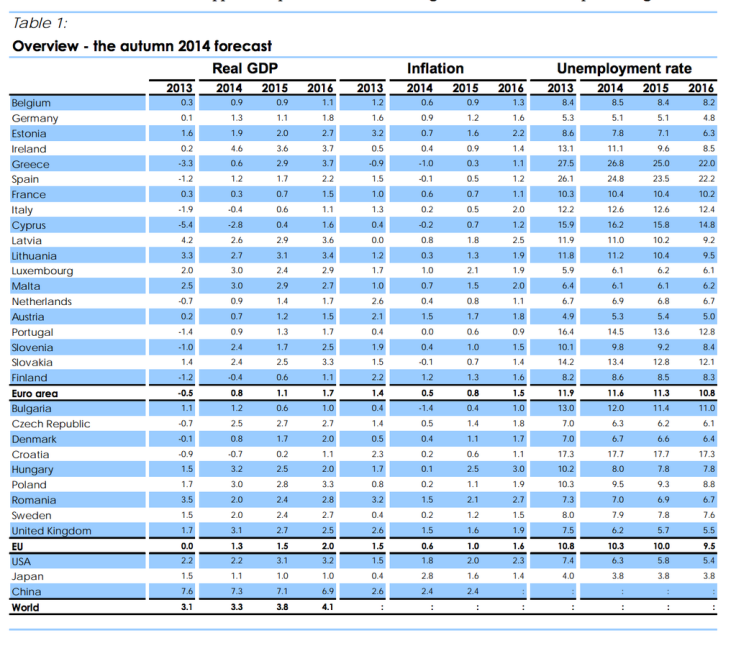Irish Economy to Outpace the Rest of Europe as Eurozone Growth Forecast Slashed

The European Commission may have slashed its growth prediction for the eurozone this year, but policymakers in Dublin will be celebrating as the fastest-growing European economy for the next three years.
The commission has cut its eurozone growth forecast from 1.2% to 0.8%, with anaemic GDP and inflation levels plaguing some of its most important economies.
In its Autumn 2014 Forecast, the commission has predicted that the region will show inflation levels of just 0.5% and while the picture looks marginally better for the coming two years, the figures are little for officials to get excited about.
In 2015, the eurozone is forecast to grow by 1.1%, with 1.7% growth expected in 2016. Meanwhile, inflation will languish at 0.8% next year and 1.5% in 2015, the commission's statisticians predict.
The Irish economy, however, is expected to perform "substantially above average" over the next three years. This year, it is forecast to grow at 4.6%, for 2015 the figure is 3.6% and 3.7% for 2016. It's in marked contrast to 2013, when the economy grew by just 0.2%. Over the next three years, it will be the fastest-growing economy in the European Union.
"The business cycle is decoupling from that of the euro-area, with Ireland benefiting from its strong trade links with the more dynamic UK and US markets. Net exports and the recovery in domestic demand are likely to fuel real GDP growth of 4.6 % in 2014. Sustained growth is set to continue in 2015 and 2016 at around 3.6 %, with some stimulus provided by tax cuts and expenditure increasing measures in 2015, wrote Marco Buti, the European Commission's Director General of Economic and Financial Affairs.
Fears over weak demand and deflation elsewhere in the eurozone have existed for some time and while the UK is not a member of the single currency, the fact that consumption is so tepid in its biggest export market will also be cause for concern in Downing Street.
In the report, the UK is predicted to grow at 3.1% this year, 2.7% next year and 2.5% the year after. The wider European Union will grow at 1.3% this year, 1.5% next year and 2% in 2016.
"The slowdown in Europe has occurred as the legacy of the global financial and economic crisis lingers on in the form of deleveraging pressures and incomplete internal and external adjustment. A weakness of potential growth that was already visible in low productivity gains in the pre-crisis years has been exacerbated by the contraction in capital formation and the increase of structural unemployment since 2008.
"In the first half of 2014, a slowdown of GDP growth among the EU's major trading partners and the rapidly deteriorating geopolitical situation, have affected the EU through slower-than-expected export growth and negative confidence effects. With the observed slowdown of activity, slack in the EU economy remains large and is weighing on inflation, which is also being dragged down by tumbling energy and food prices," Buti said.
Concerns abide over the bloc's two largest economies, France and Germany. In the case of the former, the report's authors are scathing. Growth will remain weak for three years, with the commission highlighting weak export expectations, poor labour market conditions and the rising government deficit as the main drags on the economy.
For Germany, which is predicted by many analysts to slide into recession before the end of 2014, the view from the commission is slightly rosier.
"Germany's economy is expected to broadly stagnate over the second half of this year but economic growth is set to resume gradually with the support of a robust labour market, favourable financing conditions, and improving external demand. A recovery in corporate investment has been interrupted and is expected to resume only hesitantly. The general government budget is forecast to remain broadly balanced and the gross debt-to-GDP ratio to decrease," the report said.

© Copyright IBTimes 2025. All rights reserved.






















